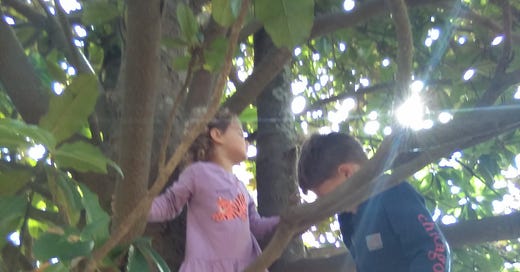Today at Front Porch Republic, I have a short essay: Bringing Up Emil.
Some background: Over the past few months, the kids and I have been slowly making our way through the complete works of Astrid Lindgren. She is best known for her books about Pippi Longstocking, but she wrote quite a bit more, and all of her books are stories children, parenting, and family life. They are quirky and appeal in different ways to both kids and adults. My kids are able to enjoy the stories and laugh at the shenanigans in the books, because they are genuinely funny. Meanwhile, as a parent, I’m able to pick up on the more serious ideas that emerge as well. And one such idea from Lindgren’s books about a little boy, Emil, forms the subject of my essay today. A taste:
“Kids are hard on houses,” my husband is fond of casually observing. Mind you, he never says it in anger; it’s more of a statement of fact, an observation of a universal truth, a resigned nod in reply to the crayon and pen marks on the walls and floors, scratches from toy trains and cars on the coffee table, the awkward sagging of couches and armchairs that have too often been mistaken for a trampoline, and the occasional apple that someone took a bite from and then dutifully replaced in the fruit bowl.
To be clear, our kids aren’t spoiled. We do our best to teach them to be good stewards—of our home, of the neighborhood, of our church and this world. They do chores around the house and in the yard, they usually make their beds in the morning, and they generally pitch in and help, sometimes even unasked, although more often a prompting is helpful. They are thoughtful, obedient kids.
But all kids are also kids—meaning, sometimes they are prone to do something that someone with a fully developed frontal lobe might consider dangerous, reckless, or plain stupid—or at least rather annoying and inconsiderate…
We talk about kids as “good” or not, but perhaps to speak of a good boy is only appropriate when referring to dogs. Kids are good in a theological sense, always. Sometimes, however, their behavior is not what adults would call good. Yet at least on occasion this assessment says more about the adults’ expectations than it does about the child…
Emil is a preschooler who lives on a farm with his parents, younger sister, Ida, and the farm employees, Alfred and Lina. The stories are structured around Emil’s escapades, each story narrating one particular day in this little boy’s life. On such-and-such an ordinary day, here’s what Emil did to land him in trouble…
But while Emil does seem to accumulate infractions faster than the average kid, perhaps what is most striking about him is that he is a remarkably thoughtful boy.
You can read the full essay here.




